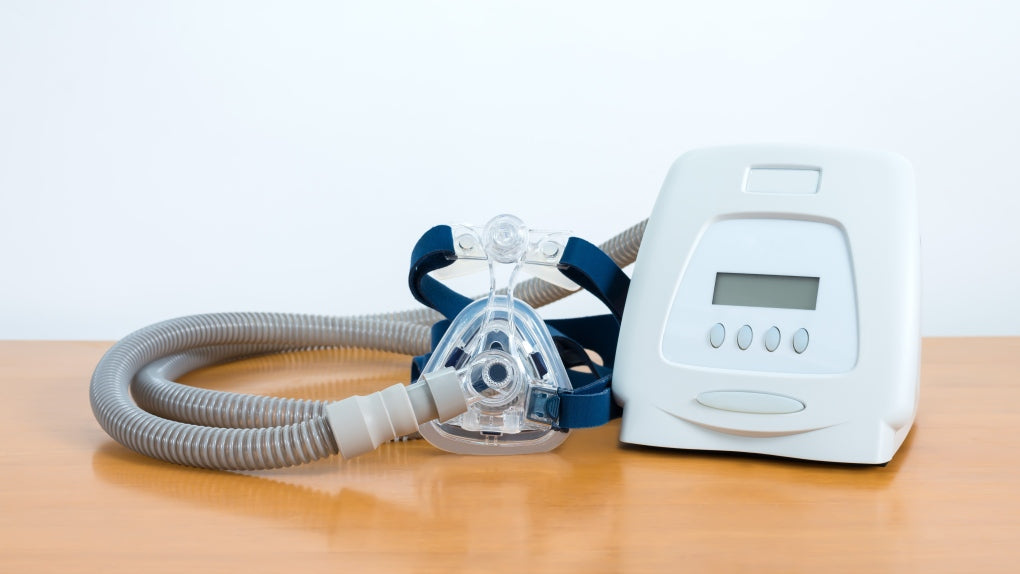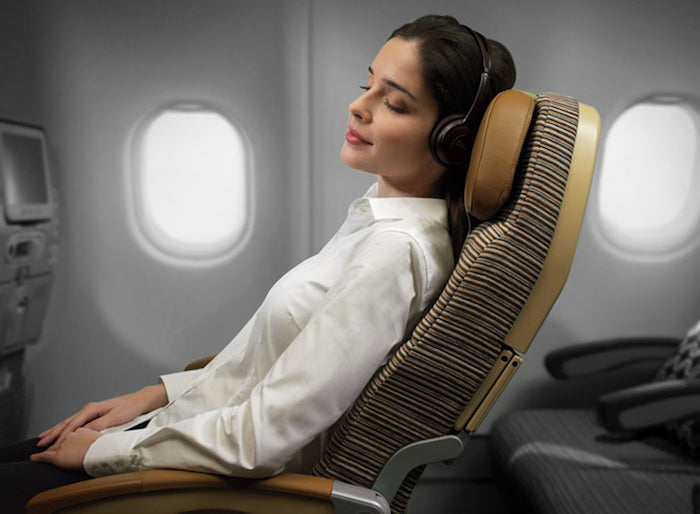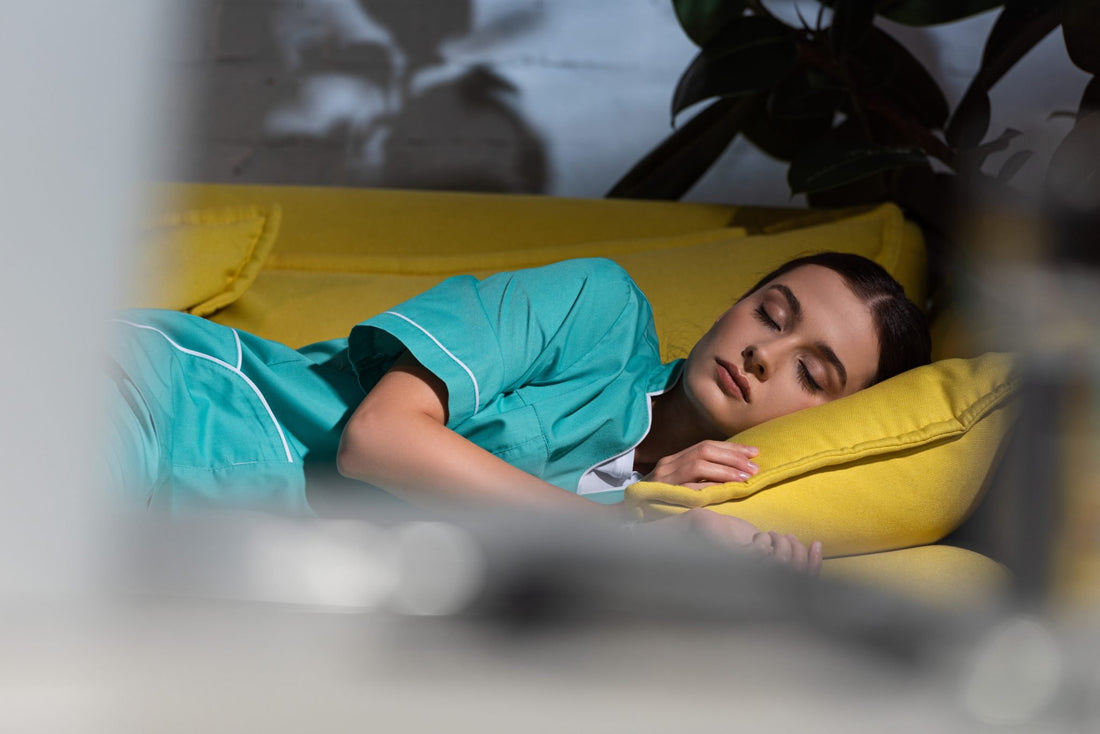News
The Link Between Sleep and Alzheimer's
wp:paragraph January is Alzheimer’s awareness month in Canada. Alzheimer’s disease affects many older adults and can cause their thinking ability and memory to deteriorate over time. These patients face numerous struggles with their day-to-day lives, including sleep. /wp:paragraph wp:paragraph If you are caring for a loved one with Alzheimer’s, there are a few important things to know about how their sleep can be affected, and how to help them. /wp:paragraph wp:paragraph Common sleep problems amongst Alzheimer’s patients /wp:paragraph wp:list Trouble falling and staying asleep: the sleep cycle of an Alzheimer’s patient does not typically follow the same pattern of a healthy adult. They tend to wake up more often in the night and have trouble falling back asleep and their brain works differently. Daytime napping: many Alzheimer's patients tend to feel drowsy during the day and restless and agitated in the evening hours, also known as "Sundowning.” This is extremely common amongst Alzheimer’s patients Other medical issues: depression, restless legs syndrome and sleep apnea are all extremely common for Alzheimer’s patients and can negatively affect their sleep. /wp:list wp:paragraph How to resolve these sleep issues /wp:paragraph wp:list Establish a routine: it is important to keep consistency among daily activities such as mealtimes, medication, exercise and bedtime in order to promote a more restful sleep at night. Avoid stimulants: alcohol, caffeine and nicotine should be avoided before bedtime. Over the counter sleep medications such as Melatonin can be helpful but check with a doctor first as this could negatively interfere with other medications. Keep the bedroom comfortable: make sure the temperature in the room is comfortable and only use the bed for sleeping. Try and discourage afternoon napping if possible, so that it doesn’t interfere with sleep Promote relaxation in the evenings: limit the use of TV when it is close to bedtime. Instead, try listening to an audio book or playing peaceful music. Be sure to speak to a doctor for treatment if there are medical issues interfering with a proper night’s sleep. /wp:list
about The Link Between Sleep and Alzheimer'sInsomnia and Pandemic Stress
wp:paragraph Do you find yourself experiencing insomnia more than ever these days? /wp:paragraph wp:paragraph With the recent rise in Covid-19 cases thanks to the new Omicron variant, this is extremely common. A lot has recently changed with respect to gatherings, travel, work from home orders, and more, and many people are experiencing stress and not sleeping well as a result. Whether you are back to working remotely, limiting gathering with others, or if you are one of the unlucky ones that have had to deal with isolation or a positive test result, it is very common for sleep to be affected by all the uncertainty in the world right now. /wp:paragraph wp:paragraph If you are experiencing insomnia because of all of this, you are not alone. Here are a few tips to help insomnia related to pandemic stress. /wp:paragraph wp:paragraph Limit technology and media consumption /wp:paragraph wp:paragraph As tempting as it can be, try to avoid the overuse of your electronic devices including phones and tablets. Furthermore, be careful as to how much of the news you watch or read, especially news that is related to the pandemic as this can cause a lot of unnecessary anxiety, which in turn can affect your sleep. If you absolutely must keep up with the news, try reading only a few articles with relevant information or limit your news watching to 30 minutes so you don’t feel anxious and overwhelmed. /wp:paragraph wp:paragraph Get moving /wp:paragraph wp:paragraph Exercise can be extremely beneficial for helping to combat stress related to the pandemic. While some options may be limited thanks to the cold outdoor temperatures, some of the simpler exercises such as going on a walk or doing a short yoga routine at home can help with this. Exercise helps to release endorphins which are beneficial to your body when it is time to go to sleep. /wp:paragraph wp:paragraph Stick to a routine /wp:paragraph wp:paragraph For many people, stress tends to escalate when any sort of routine you have is thrown off. Routines tend to help us maintain a healthy and balanced lifestyle and to feel a sense of normalcy. This is especially true when it comes to routines that coincide with sleep. Make sure you stick to a good bedtime routine at night, which includes going to bed and waking up at the same time each day (or as close to the same time as possible). /wp:paragraph
about Insomnia and Pandemic StressSleep and the winter solstice
wp:paragraph December 21st marks the shortest day of the year, otherwise known as the winter solstice. What does this mean for your sleep? /wp:paragraph wp:paragraph The winter solstice occurs when the amount of daylight is the shortest it will be all year based on how the sun moves around the earth. If the lack of daylight is already starting to feel like a nuisance, be prepared for that day to feel a little “darker” than normal. /wp:paragraph wp:paragraph How the winter solstice can affect your sleep /wp:paragraph wp:paragraph Although it may be easy to think that darkness outside means better sleep, this is not necessarily the case. Your internal clock, also known as your circadian rhythm, relies on a 24-hour clock, which can be thrown off from the daylight outside (or lack of), making it more difficult to sleep. Insomnia is very common from this, and you may also find that it takes you longer to fall asleep as well. /wp:paragraph wp:paragraph Also, it is perfectly normal for you to feel a little more tired and fatigued than normal during the daytime hours thanks to the lack of daylight. You may also find yourself feeling a little moody and unmotivated from the lack of daylight, which in turn can affect your sleep. /wp:paragraph wp:paragraph A few tips to beat the winter blues /wp:paragraph wp:paragraph Try and get outside during the daytime when it is light out, as your circadian rhythm can be improved from exposure to sunlight. While this may not be possible every day, there are daylight lamps that may help with this. /wp:paragraph wp:paragraph Avoiding technology before bed is also important for sleeping better. The blue light from your cell phone can disrupt your circadian rhythm and make it difficult to fall and stay asleep. Experts recommend doing stretches before bedtime to help you feel relaxed. /wp:paragraph wp:paragraph A few other things that will help include reading a book before bedtime, using a sleep mask, keeping the temperature of your room on the cool side and using blackout curtains to help you sleep better. /wp:paragraph
about Sleep and the winter solsticeSleep Tips for the Holidays
wp:paragraph The holiday season can be such a wonderful time of year, but it can also be very disruptive to your sleep schedule in a number of ways. Don’t let the lack of sleep turn you into a grinch! Here are a few ways in which your sleep can be disrupted over the holidays, and how to fix it. /wp:paragraph wp:paragraph Being too busy: yes, the holidays are a busy time between parties, gatherings, shopping, and more. This can make you feel overwhelmed and in turn, can affect your sleep if you are feeling anxious about everything you have to do. Take some time to slow down. Prep in advance as much as you can so you don’t feel as overwhelmed and try not to take on more than you can handle. /wp:paragraph wp:paragraph Eating habits: it’s natural to want to indulge in some of your favorite foods at this time of year, it’s just too irresistible! But be careful, going to bed when you feel too bloated can disrupt your sleep and cause insomnia, not to mention it can be very uncomfortable. Pace yourself at the dinner table and stop eating when you feel full. /wp:paragraph wp:paragraph Drinking too much: whether you are gathering with loved ones or just enjoying a quiet night at home where you don’t have to work the next day, many people tend to go overboard drinking during the holidays. Drinking too much alcohol before bedtime can disrupt your REM sleep, making for a very restless night. An extra drink or two is usually okay but don’t go too crazy, and be sure to stay hydrated. /wp:paragraph wp:paragraph Not enough exercise: while it may seem too easy to just sit on the couch watching your favorite Christmas movies, be sure to get up and get in some physical activity. Try to go for a walk at least once a day or take this time to partake in your favorite outdoor winter activity. It can also be a great family bonding opportunity. /wp:paragraph wp:paragraph Sleeping in and staying up late: yes, late nights happen, and if you stay up late then you may find yourself sleeping in as a result, especially if you know you don’t have to work the next day. Slip-ups happen and that’s okay! Just make sure you don’t deviate too much from your routine and you get back on track the next day. /wp:paragraph
about Sleep Tips for the HolidaysSleep Tips for Holiday Travel
wp:paragraph Thinking of going away over the holiday? Many people experience poor sleep whenever they travel, whether they are going to an unknown destination or staying with family. All of the excitement and disrupted routines surrounding the holidays do not help either. /wp:paragraph wp:paragraph Whether you are going on a road trip or braving the airports to venture somewhere a little further away, here are a few tips to keep in mind to help make sure you can still get a good night’s sleep wherever you are. /wp:paragraph wp:paragraph Plan ahead: stress is one big reason why sleeping away from home is not always great. Take the time beforehand to figure out other factors like packing, your itinerary, and other logistics to reduce stress while you are away. /wp:paragraph wp:paragraph Maintain a routine: while your normal sleep routine may be disrupted, try your best to stick to your usual sleeping routine. Try to go to bed as close to your normal bedtime as you can and limit the use of technology for 1 hour before you go to bed. If you are traveling to a different time zone, be sure to adjust your sleep to the current time zone in order to make the most of your trip. /wp:paragraph wp:paragraph Bring the essentials: Be sure to pack a few sleeping essentials such as earplugs, sleeping masks, melatonin, warm pajamas, and your favorite book just to make yourself feel at home and more comfortable at bedtime. /wp:paragraph wp:paragraph Practice healthy habits: sticking to healthy diet and exercise habits will help with your sleep. Eat a balanced diet, get some exercise throughout the daytime, and don’t overdo it with alcohol. /wp:paragraph wp:paragraph Relax and enjoy the holidays: it’s a happy and joyous time of year so make sure you give yourself time to enjoy it! Bad sleep happens to everyone at some point. If you have one rough night’s sleep, give yourself a little grace. It’s just one night and you can get back on track the next day. /wp:paragraph wp:paragraph After reading sleep tips for holiday travel you can read "Travelling with a CPAP Machine". /wp:paragraph
about Sleep Tips for Holiday TravelFive Sleep Tips for Shift Workers
wp:paragraph Do you work irregular hours (or overnight shifts) and find yourself struggling to maintain a sleep schedule? You are not alone. There are many people who don’t work the typical 9-5 hours, therefore they do not always sleep at the same time every night. Sleep is essential for you to be at your best, especially at work, so it is important to make the most of the sleep you can get, no matter what time of day it is. /wp:paragraph wp:paragraph While it may seem easier said than done, there are ways to help you sleep better even if you are working an irregular schedule. Here are a few tips to make the most of your sleep if you are a shift worker. /wp:paragraph wp:list {"ordered":true,"type":"1"} Limit Caffeine /wp:list wp:paragraph One cup of coffee is okay at the start of your shift, and maybe a small cup every 1-2 hours, just to keep you awake during your shift but try to avoid caffeine at least 3-4 hours before bedtime. /wp:paragraph wp:list Create the perfect sleeping environment /wp:list wp:paragraph If you need to sleep during the day, keep your bedroom or designated sleeping area as dark as possible (blackout curtains would work best for this) and keep the temperature of the room on the cooler side. /wp:paragraph wp:list Limit Distractions /wp:list wp:paragraph Keep your phone and other devices on silent and ask other members of your household not to disturb you while you are sleeping unless it is an emergency. /wp:paragraph wp:list Follow a routine /wp:list wp:paragraph Make sure you follow the same bedtime routine when going to sleep, even if it is the daytime or your schedule is inconsistent. This will help your body to wind down and prepare for sleep. /wp:paragraph wp:list Set boundaries /wp:list wp:paragraph If at all possible, try to place limits on the amount of overnight shifts you take on, as the irregular schedule can be hard on your body. If this cannot be avoided, this is where having a routine will be extremely important. Speak to your doctor if you are experiencing multiple episodes of insomnia or other sleeping problems. /wp:paragraph
about Five Sleep Tips for Shift WorkersThe Importance of Cleaning Your CPAP Device
wp:paragraph If you suffer from sleep apnea and you regularly use a CPAP Machine at night, you may be used to the fact that you have to keep your device clean on a regular basis. Not sticking to a regular cleaning routine for the various parts of your CPAP Device can result in the parts breaking down and wearing out much more quickly than they are supposed to. Having to replace some of these parts can be extremely costly. Worse, your CPAP therapy may not work to its full potential if the machine parts go too long in between cleanings. /wp:paragraph wp:paragraph However, if you take the time to clean your CPAP machines and its parts of dust and facial oils, the parts can last you quite a long time before requiring replacement and overall, the CPAP therapy will work the way it’s supposed to. /wp:paragraph wp:paragraph How often do I need to clean my CPAP device? /wp:paragraph wp:paragraph CPAP Devices and their parts can get dirty very quickly as a result of dust and facial oils. Most parts will benefit from a clean at least once a week, however some parts such as the headgear cushions, tubing and humidifier chamber may need to be cleaned daily, especially if they are touching your face. /wp:paragraph wp:paragraph A few tips for cleaning your CPAP device and parts /wp:paragraph wp:list Check the manufacturers warranty for specific cleaning instructions Take the mask apart to give it the best clean Hand wash the parts of your mask using lukewarm tap water, a soft bristle brush and a mild soap Do not use any soaps containing harsh chemicals such as bleach or alcohol. A mild medical grade soap will do just fine (some mask manufacturers may offer a cleaning solution for their CPAP devices) Do not wash your mask parts in a washing machine or dishwasher and do not leave them in direct sunlight to dry Wash your face before using the mask in order to keep it clean and prolong its life If you notice any parts with cracks or other deficiencies, be sure to have the part replaced as soon as possible! /wp:list
about The Importance of Cleaning Your CPAP DeviceCPAP and COVID19: Your Questions Answered
wp:paragraph If you have Sleep Apnea, you may be worried about CPAP and COVID19. Take a read below for tips and info. /wp:paragraph wp:paragraph Does having Sleep Apnea make me high risk for COVID19? /wp:paragraph wp:paragraph There is no evidence linking sleep apnea with coronavirus risk. According to the centre for disease control (CDC), People who have a higher risk for severe illness from the coronavirus include: /wp:paragraph wp:list 65 years of age or older Those with serious underlying medical conditions. Those who are immuno-compromised Those who have been close contact with another person who has the coronavirus. /wp:list wp:paragraph What should I do if I have symptoms (should I use my CPAP while sick)? /wp:paragraph wp:paragraph If you have symptoms of the coronavirus, you should isolate yourself in a separate bedroom and use a separate bathroom, if available. In this “recovery room,” you should continue to use your CPAP while you sleep alone. Evidence suggests that use of CPAP is more likely to produce large droplets (>10 μm) rather than aerosols, and that these are largely confined to within one meter due to their large mass.This suggests that the risk of droplet dispersion as a result of use of CPAP is not a major issue, and is probably no different than any COVID-19 patient in the who is coughing or sneezing without CPAP. /wp:paragraph wp:paragraph Any extra cleaning tips? /wp:paragraph wp:paragraph The centre for disease control (CDC) recommends cleaning and disinfecting your medical equipment according to the manufacturer’s instructions. The directions for CPAP masks and hoses normally include regular cleaning with soap and water. /wp:paragraph wp:paragraph The CDC also recommends that you clean and disinfect frequently touched surfaces in your household. This includes door knobs, light switches and handles. Learn more from the CDC about how to clean and disinfect your household. /wp:paragraph wp:paragraph /wp:paragraph wp:paragraph /wp:paragraph wp:paragraph Newly diagnosed with OSA and need CPAP? Shop CPAP, CPAP Masks, and Accessories Now! /wp:paragraph
about CPAP and COVID19: Your Questions AnsweredFestive Season 2020 - CPAP Tips
wp:paragraph It's going to be a very different festive season this year. Not as much cooking and shopping and going out to holiday gatherings as we're used to. While we can still find ways to have fun in our social bubbles, the stress of 2020 can also get exhausting. That's why getting enough quality sleep is more important than ever. /wp:paragraph wp:paragraph If you use a CPAP machine to help address your sleep apnea, you may be inclined every so often to skip using it. After all, the 2020 holiday season could make you just want to slip quickly into bed for some sleep. But definitely don't fall into that habit! No matter how enticing your bed may be, always take a few minutes to set up your CPAP machine for use at night. /wp:paragraph wp:paragraph Here's why... /wp:paragraph wp:paragraph You may think that missing one night here and there, especially during the holidays, won't really make a difference in the long run. But what you are doing is setting up the foundation for the habit of not using your CPAP machine. When you don't use your machine - even for one night - you run the risk of having a poor quality sleep. As you gradually become more and more fatigued, you can increase your risks for irritability, headaches, forgetfulness, and even more serious issues such as heart attack or stroke. And more immediately, those headaches and fatigue will mean that you will have less fun during the holidays. And who wants that? /wp:paragraph wp:paragraph So even when you don't feel like it, always be sure to use your CPAP machine to encourage yourself to be the best version of you any time of the year. /wp:paragraph wp:paragraph Newly diagnosed with OSA and need CPAP? Shop CPAP, CPAP Masks, and Accessories Now! /wp:paragraph
about Festive Season 2020 - CPAP Tips






